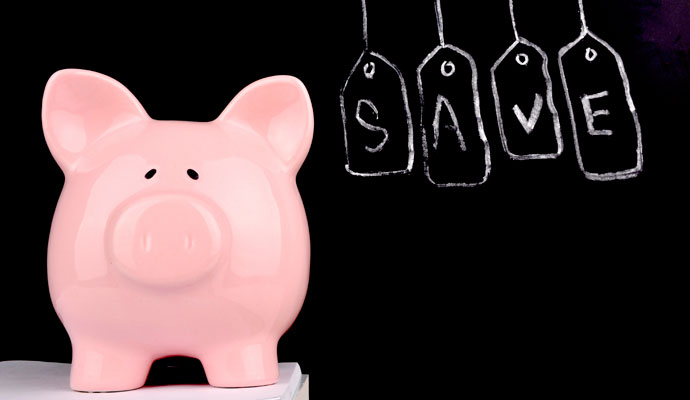How I finally got my financial act together at 35
I had never even kept a budget

A free daily email with the biggest news stories of the day – and the best features from TheWeek.com
You are now subscribed
Your newsletter sign-up was successful

I hand over my debit card, and a sudden sense of dread comes over me as the barista swipes it.
It's Sunday — the end of my first week following a budget that lets me spend $300 a week on groceries, entertainment, and overpriced lattes — and the $4.94 soy chai I'm buying is putting me dangerously close to blowing it. Six cents away, to be exact.
I've never felt this kind of nervousness when forking over my card — and I've never experienced buyer's remorse. So this is what that feels like, I think to myself.
The Week
Escape your echo chamber. Get the facts behind the news, plus analysis from multiple perspectives.

Sign up for The Week's Free Newsletters
From our morning news briefing to a weekly Good News Newsletter, get the best of The Week delivered directly to your inbox.
From our morning news briefing to a weekly Good News Newsletter, get the best of The Week delivered directly to your inbox.
It's a first for me because I've never really budgeted before.
When I graduated from college 13 years ago, my mom urged me to use the "envelope system" that her mom had taught her. In a nutshell, at the beginning of each week, you put $100 cash — or however much you can afford — in an envelope to use as your "fun money."
"When the money's gone, it's brown-bagged lunches and no shopping," she told me.
It seemed like a good idea — if only I hadn't moved to New York City, making a measly $27,000 salary. It would have been tough to make that money stretch anywhere, let alone in one of the priciest metro areas in the country. So I stashed those envelopes my mom gave me in the far reaches of my underwear drawer and started living the good life … on my credit card.
A free daily email with the biggest news stories of the day – and the best features from TheWeek.com
You can guess how that played out.
Each time my salary inched upward, so did my spending habits — with my credit card debt rising to a high point of $20,000. I'd pick up freelance work to make sure I was paying more than the minimum on my card, but it wasn't making a big dent.
It took leaving New York in 2006 — and moving in with my best friend in Boulder, Colo., whose parents owned the house and gave me the huge gift of no rent — to finally start making tracks on getting out of debt. It took me nearly two years to completely wipe it out — and I've stayed debt-free ever since.
But even though I tackled that huge financial endeavor, I never did learn my lesson when it came to budgeting.
My 30-something financial wake-up call
Even when I moved to Los Angeles in 2009 and my salary hit six figures, I still didn't get on board with budgeting.
It wasn't that I'd tried giving myself a spending limit and it didn't stick — I just didn't worry about cash. Buoyed by the fact that I'd been out of debt for over a year, I felt happy to just float along, spending money when I wanted without going hog wild.
Sure, I was doing some things right, like stashing 5 percent of my income into a 401(k) and a Roth IRA. But I had zilch when it came to emergency savings.
It wasn't until July 2013, when I transitioned from corporate life to working for myself, that it really hit home how important it is to have a safety net. Thankfully, I'm not struggling — I still make six figures — and I'd secured a big, steady gig that beefed up my savings to about $20,000 before I took the leap, but there's something about not knowing when the next check is going to come that inspires a hyper-focus on having your finances in order.
Between that and my realization that, at 35 years old, I wasn't saving enough for retirement in order to have the life I wanted, I knew it was time to get serious about my money.
So I reached out to a certified financial planner for some advice. I'll admit I was nervous. And I was worried I'd feel restricted, not to mention judged. A finance writer who doesn't follow a budget?!
But my anxiety was quickly replaced with excitement when he assured me that I'm totally normal for not hopping on the budgeting bandwagon sooner, and actually warned me not to overdo it — a mistake a lot of newbies apparently make when they're first starting out.
It's kind of like being on a diet that's too drastic, he explained. Cut out too many food groups, and you'll feel so deprived that you'll end up bingeing on bagels, ice cream, and chocolate cake — and find yourself in a worse place than when you started. I've been on that bagel binge after a no-carb diet before, so the warning resonated.
Excited by the fact that a bona fide money pro was urging me not to deprive myself, I got to work.
Digging into my money life — and devising a big-picture budget

My first order of business was to calculate my fixed costs — housing, health insurance, rent, bills, and Netflix — and then figure out what I needed to set aside to properly save toward financial priorities, like emergency savings, retirement contributions, a travel fund, and saving for a down payment on a house.
Since I'm trying to make up for some lost time, I decided to get a bit aggressive and dedicate about 25 percent of my total pay to achieving those goals. After that, I listed out my nonmonthly expenses — things like quarterly taxes, auto registration, gifts, and haircuts — and factored those in too.
Once I accounted for all this big stuff, I had $1,300 leftover, which I divided by 4.3 to account for months with five weeks. And that's how I landed on my $300 weekly "fun money" budget.
The whole process was eye-opening — shocking even — to see just how quickly such sneaky expenses as $40-a-pop eyebrow waxes and $1,000-plus on Christmas travel and gifts add up. This, I realized, is why people who make plenty of money — but don't budget — end up wondering where all of their money is going.
To better understand exactly where my money was going — and how my savings was growing — the planner recommended opening several distinct checking and savings accounts:
1. One checking account where all of my income is deposited.
2. One checking account where I transfer enough money to pay all of my bills.
3. Another checking account where I transfer $1,300 to be spent over the month.
4. Separate savings accounts for each of my key financial goals.
At first, this felt a bit overwhelming — until I tried it and realized that automating my savings would actually make life easier in the long run, especially during periods when I wasn't feeling as motivated to stick to my budget.
I also liked the idea of having specific savings accounts for different goals because it would make me think twice before dipping into them unnecessarily. So if I pulled money out of my travel fund to pay for something else, I'd realize the trade-off I was making — and hopefully rise above the temptation.
Another game-changing tip I picked up: The benefit of visualizing my financial goals. While I've always had some vague answers to this question about my finances — "I want to live a comfortable life and not stress about money" — I've never thought in great detail about the kind of house I see myself buying or exactly how much money I'll need to live comfortably in retirement.
So I printed a little picture of a dreamy beach cottage I'd love to buy one day, and taped it to the back of my debit card. When I was shopping later that week, I spotted it as I was about to pay for a puffy vest I didn't need. I left the store without the vest — and actually felt good about it.
The lotto effect of budgeting
Of course, actually sticking to my new budget hasn't been all puppies and rainbows. While $300 a week sounded like ample spending money at the start of this experiment, it's amazing how quickly I can blow through it.
To wit: Last Monday night, I met up with a group of girlfriends for dinner and spent $50 on wine and food. Months ago I'd have thought that was a cheap night out. This time I was inspired to do some calculations on my drive home, anticipating how much I could realistically spend on the other plans packed into my social calendar for the week.
With another dinner out and a day trip into New York City planned with my sister that Saturday, I was going to have to scrimp a little on groceries and make my own coffee and tea until the following Monday, when my weekly budget would replenish.
Now that I've hit my budgeting stride, I've realized that not only have these short, weekly budget goals helped me to stay on track, but believe it or not, the process has also made me happier about my spending overall.
When I called up the planner to report back about my brand-new attitude, he wasn't surprised. In fact, he said that clients have compared suddenly seeing money growing in a savings account — funds they weren't used to having — to winning the lotto.
Keeping the number of soy chai lattes I order in check in exchange for feeling like I've won the lottery one day? Seems like an exciting trade-off to me.
This story was originally published on LearnVest. LearnVest is a program for your money. Read their stories and use their tools at LearnVest.com.
More from LearnVest...